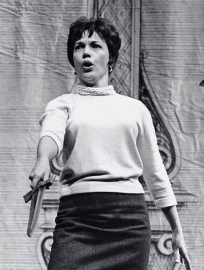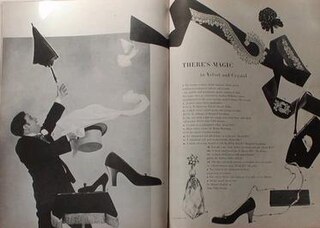Related Research Articles

Phyllis Curtin was an American classical soprano who had an active career in operas and concerts from the early 1950s through the 1980s. She was known for her creation of new roles such as the title role in the Carlisle Floyd opera Susannah, Catherine Earnshaw in Floyd's Wuthering Heights, and in other works by this composer. She was a dedicated song recitalist and retired from singing in 1984. She was named Boston University's Dean Emerita, College of Fine Arts in 1991.

Frances Yeend was an American classical soprano who had an active international career as a concert and opera singer during the 1940s through the 1960s. She had a long and fruitful association with the New York City Opera (NYCO) between 1948 and 1958, after which she joined the roster of principal sopranos at the Metropolitan Opera where she sang between 1961 and 1963. She also had an extensive concert career, particularly in the United States. By 1963 she had sung in more than 200 orchestral concerts in North American with major symphonies like the New York Philharmonic, the Boston Symphony Orchestra, the Philadelphia Orchestra, the Cleveland Orchestra, and the Chicago Symphony Orchestra among others.
Deborah Cook was an American operatic soprano who had a prolific international opera career during the 1970s and 1980s. Her career was primarily focused in Germany where she lived from 1972 through 1985. However, she did travel extensively throughout Europe and in the United States, performing in operas, concerts, recitals, and recording for radio productions. A gifted coloratura soprano, Cook sang a wide repertoire that encompassed English, German, French, and Italian opera from a variety of musical periods. She notably sang in a number of world premieres including Hans Werner Henze's We Come to the River at the Royal Opera, London in 1976.

Carlo Cossutta was a prominent Italian dramatic tenor of Slovene descent who had a major international opera career that spanned from the mid-1950s through the late 1990s. He began and ended his career at the Teatro Colón in Buenos Aires where he sang regularly from 1958 through 1998. He first drew international attention in 1964 when he sang the title role in the world premiere of Alberto Ginastera's Don Rodrigo, which led to a series of appearances at the Royal Opera, London during the 1960s. In the 1970s his international career skyrocketed with appearances at most of the major opera houses in Europe and the United States. He remained active on the international stage during the 1980s but his career slowed down significantly in the 1990s after he contracted liver cancer.

Richard Cassilly was an American operatic tenor who had a major international opera career between 1954–90. Cassilly "was a mainstay in the heldentenor repertory in opera houses around the world for 30 years", and particularly excelled in Wagnerian roles like Tristan, Siegmund and Tannhäuser, and in dramatic parts that required both stamina and vocal weight, such as Giuseppe Verdi's Otello and Camille Saint-Saëns's Samson.

Beverly Wolff was an American mezzo-soprano who had an active career in concerts and operas from the early 1950s to the early 1980s. She performed a broad repertoire which encompassed operatic and concert works in many languages and from a variety of musical periods. She was a champion of new works, notably premiering compositions by Leonard Bernstein, Gian Carlo Menotti, Douglas Moore, and Ned Rorem among other American composers. She also performed in a number of rarely heard baroque operas by George Frideric Handel with the New York City Opera (NYCO), the Handel Society of New York, and at the Kennedy Center Handel Festivals.

Marie Wilt was an Austrian dramatic coloratura soprano. Possessing a wide vocal range with a significant amount of power and flexibility, Wilt sang a wide repertoire that encompassed the operas of Wolfgang Amadeus Mozart, the German operas of Richard Wagner, the grand operas of Giuseppe Verdi, and the bel canto operas of Bellini, Rossini, and Donizetti. She sang for many years at the Vienna Hofoper and for a number of seasons at the Royal Opera House, Covent Garden in London. She notably portrayed the role of Sulamith in the world premiere of Karl Goldmark's Die Königin von Saba in 1875. Also a regular performer of the concert repertoire, Wilt often appeared in performances of works by Beethoven, Haydn, and Mendelssohn.
William Dooley is an American operatic bass-baritone who has sung with many of the world's greatest opera companies. He began his career in Germany in the late 1950s, ultimately becoming a leading performer at the Deutsche Oper Berlin from 1962 to 1964. He then embarked on a highly successful career at the Metropolitan Opera where he sang regularly between 1964 and 1977. Between 1977 and 1982 he sang regularly at the Vienna State Opera, after which he remained active as a freelance artist on the international stage through the early 1990s.

Adelaide Bishop was an American operatic soprano, musical theatre actress, opera director, stage director, and voice teacher. She began her career appearing in Broadway musicals as a teenager during the early 1940s. She became a principal soprano with the New York City Opera (NYCO) in 1948, where she performed through 1960 in a broad repertoire encompassing German, French, Italian, and English operas from a variety of musical periods. In the late 1950s, she started working actively as a stage director and as a voice teacher, working with many opera companies throughout the United States and serving on the music faculties of several different American universities. She also served as the artistic director of the Wolf Trap Opera for many years.
Eunice Alberts (1927–2012) was an American contralto who had an active career as a concert soloist and opera singer during the 1950s through the 1980s.

Arnold Voketaitis is an American bass-baritone of Lithuanian descent who had an active singing career performing in operas, concerts, and recitals from the late 1950s through the 1990s. He enjoyed a particularly successful partnership with the New York City Opera and has performed with most of the major opera companies in North America. A strong actor, he has a powerful voice with a wide range and fine timbre.
William Chapman was an American operatic baritone and stage actor. He appeared in several Broadway productions and was notably a leading performer at the New York City Opera from 1957 through 1979.
Eva Likova was an American operatic soprano of Czech descent. She was notably one of the major sopranos at the New York City Opera during the company's early years. She also made guest appearances with a number of opera houses in North America and Europe, enjoying a particularly fruitful partnership with the Philadelphia Grand Opera Company. After retiring from the opera stage in 1966, she embarked on a second career as a voice teacher.

William R. Pell was an American opera singer who had a major international career during the 1980s and 1990s. He began his career as a baritone in the early 1970s before transitioning into the dramatic tenor repertoire in 1975. He was particularly admired for his interpretations of the works of Richard Wagner.

Andrew McKinley was an American operatic tenor, violinist, arts administrator, music educator, and school administrator. Although he mainly performed in the United States, he had an active international singing career with major opera companies and symphony orchestras from the 1940s through the 1960s. His repertoire spanned a wide range, from leading tenor parts to character roles.
Leon Lishner was an American operatic bass-baritone. He was particularly associated with the works of Gian Carlo Menotti, having created parts in the world premieres of four of his operas. He performed in many productions with the New York City Opera and the NBC Opera Theatre during the 1950s and early 1960s.
John Harger Stewart is an American tenor, conductor, and voice teacher who had an active international singing career in concerts and operas from 1964 to 1990. He began his career singing regularly with the Santa Fe Opera from the mid-1960s through the early 1970s; after which he appeared only periodically in Santa Fe up through the mid-1980s. He was particularly active with the New York City Opera during the 1970s and 1980s, and with the Frankfurt Opera from the mid-1970s through 1990. He also appeared as a guest artist with several other important American opera companies, including the Metropolitan Opera and the Washington National Opera, and at other European opera houses like the De Nederlandse Opera in Amsterdam, the Deutsche Oper Berlin, the Grand Théâtre de Genève in Switzerland, and the Wexford Festival Opera in Ireland. Now retired from singing, he is currently the Director of Vocal Activities at Washington University in St. Louis where he also teaches singing and conducts student opera productions and choirs. He also serves as the opera conductor at the Johanna Meier Opera Theater Institute at Black Hills State University.
Gloria Lane Krachmalnick was an American operatic mezzo-soprano who had an active international performance career from 1949 to 1976. In her early career she distinguished herself by creating roles in the world premieres of two operas by Gian Carlo Menotti, the Secretary of the Consulate in The Consul (1950) and Desideria in The Saint of Bleecker Street (1954); both roles which she performed in successful runs on Broadway and on international tours. For her performance in The Consul she was awarded a Clarence Derwent Award and two Donaldson Awards.
Spiros Argiris, born in Athens 24 August 1948 and died in Nice 19 May 1996 at the age of 48 of lung cancer was an orchestral and operatic conductor.
Jennifer Holloway is an American operatic mezzo-soprano and soprano who has made an international career performing at leading opera houses and festivals. She began as a mezzo-soprano singing roles such as Adalgisa in Bellini's Norma, and moved to soprano roles such as Salome and Grete Graumann in Schreker's Der ferne Klang.
References
- 1 2 3 4 Biography of Richard Cross at operissimo.com (in German)
- ↑ Free Library of Philadelphia: Box: Phila. Lyric Opera Company: 782.1 P5326p Bal Two [1968 - 1975]
- ↑ San Francsico Opera Archives
- ↑ The Metropolitan Opera guide to recorded opera
- ↑ New York Times, October 11, 1980